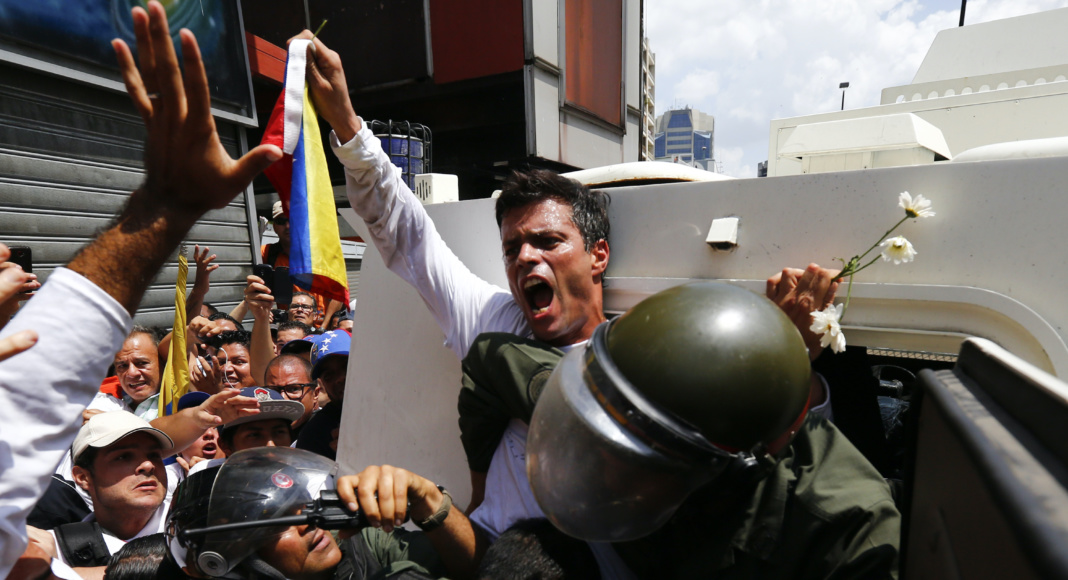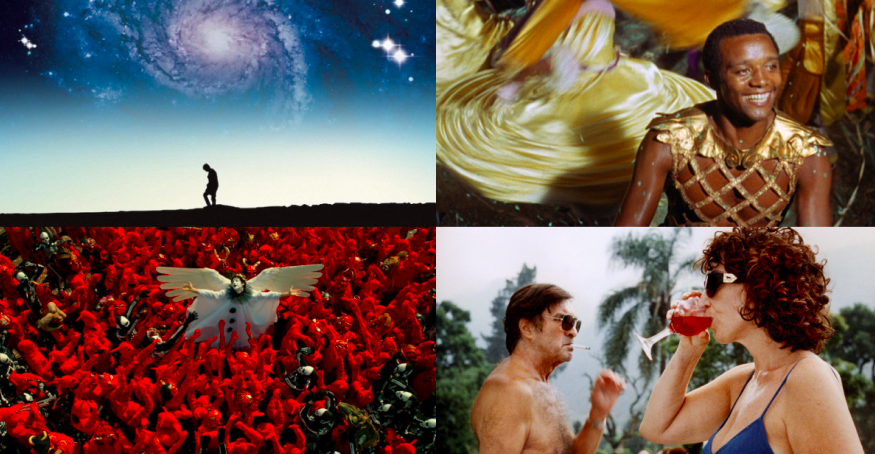Co-directors Nelson G. Navarrete and Maxx Caicedo create a film of ambitious scope which informs the viewer on the last three years in Venezuelan politics, while also painting an intimate and heartbreaking picture of the destruction wrought upon the lives of ordinary people. Rosie Thornton reviews A la calle, a documentary showing at the Human Rights Watch Film Festival (HRWFF).
“There is a leader who will always bring the people to the streets,” narrates a voice over scenes of protestors attacked with impact munitions, tear gas and water cannons, “and that leader is hunger.”
So begins A La Calle, an ambitious documentary debut co-directed and produced by Nelson G. Navarrete and Maxx Caicedo. Navarrete, born in Caracas, was forced to flee Venezuela for the United States at the age of 15, and returns to the turbulent streets of his home city to tell the story of the last three years in Venezuela. This time has been marked by catastrophic economic implosion, escalating poverty and hunger, and widespread demonstrations, which have been brutally, and often fatally, repressed by the Guardia Nacional Bolivariana de Venezuela (GNB) – Venezuela’s riot police.
Previously known for interview-style short films such as Fiends and Harvesting Hope, Navarrete brings this intimate, personal style to relate the human cost of the Maduro government’s response to the economic crisis. The viewer is first taken to the dilapidated home of Randal Blanco, a resourceful sanitation worker and barber who, despite his enterprising efforts to get by, struggles to be able to afford food for himself, his partner Yiyi and their daughter.
Navarrete and Caicedo put the struggles of ordinary Venezuelans front and centre as they explain, in chronological order, the background of events starting with Chavez’s momentous election in 1998, and the oil boom of the early 2000s, when money was poured into social programs to improve access to food, housing, healthcare and education for Venezuelans.
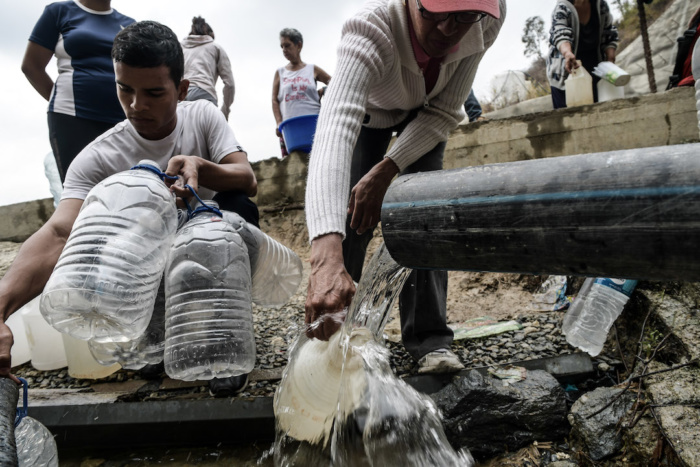
However, oil is a volatile commodity, and vulnerable to fluctuations and shocks in the international stock market. Sure enough, oil prices collapsed in 2014, after Chavez’s death and shortly after Maduro got into office. This plunged Venezuela into an unprecedented economic crisis, in which GDP plunged by 45%, a fall more dramatic than that which occurred during the Great Depression and the Spanish Civil War, as Ricardo Hausmann, the Leader of the Center for International Development’s Growth Lab at Harvard University, explains in the documentary.
We meet Nixon Leal, a young grassroots activist who tutors fellow protestors on tactics to avoid being overwhelmed by the riot police, and Federica Dávila, a medical student who founded La Cruz Verde (the Green Cross), a street medic collective who provide First Aid to protestors who are wounded and tear gassed during clashes with the GNB. This level of organising and initiative, plus the sheer resilience and courage in the face of political violence, hardship, hunger and hopelessness, are exemplified by these two young people, who also represent the ordinary Venezuelans who have taken to the streets regularly in their thousands for years.
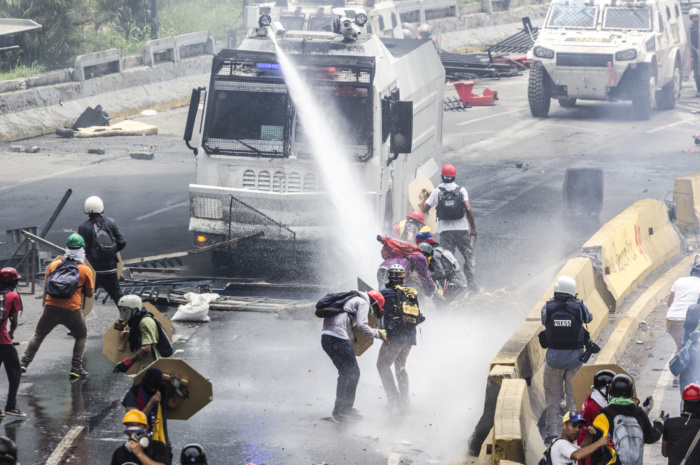
At breakneck pace, Navarrete and Caicedo take the viewer from the terrifying immediacy of the streets, to the hunger and desolation of the crumbling barrios, to the halls of the Organisation of American States (the OAS). The action is occasionally punctuated with beautiful panoramic shots of parrots gliding over the city, a Virgin Mary statue fringed with palm fronds, or the lapping waves of the ocean.
Maduro himself is presented as a bizarre, Trumpian figure: suggesting to an incredulous interviewer on an international television program that they have mental health problems when they are less than fawning towards him, and greeting novelty hat and fake moustache-wearing supporters at a rally, which appears sparsely attended. This is in contrast to Juan Guaidó, a key figure in the Venezuelan presidential crisis, who is shown as a heroic figure, riling up crowded streets with cries of “Yes, we can!”
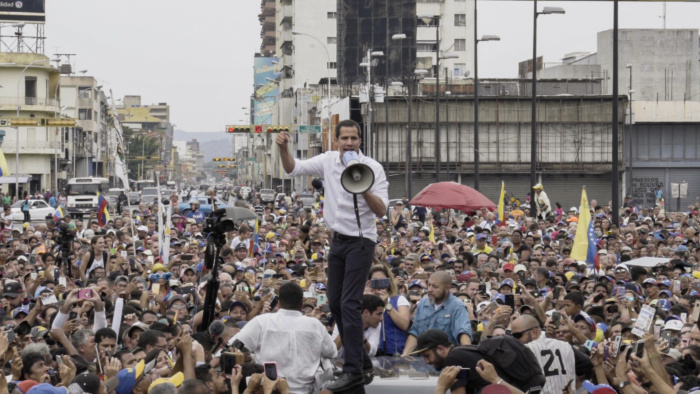
The credits show that many of the people featured have had to leave the country as their lives are threatened. All of them hope that they can one day return to help rebuild the country, their home. This film should compel all viewers to watch Venezuela carefully, and stand in solidarity with its people, as 2021 will no doubt bring further upheaval.
The film is part of the selection at the Human Rights Watch Film Festival (HRWFF) and can be virtually screened across the UK from 18–26 March, 2021. On March 23, there will be a live Q&A with filmmakers Nelson G. Navarrete and Maxx Caicedo. You can get tickets at this link.

